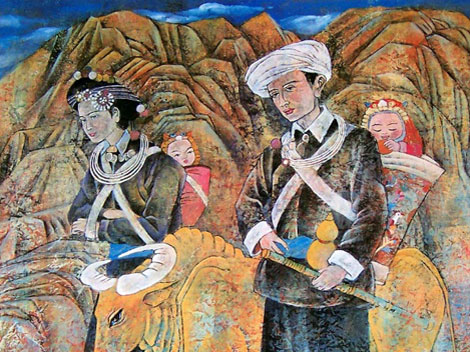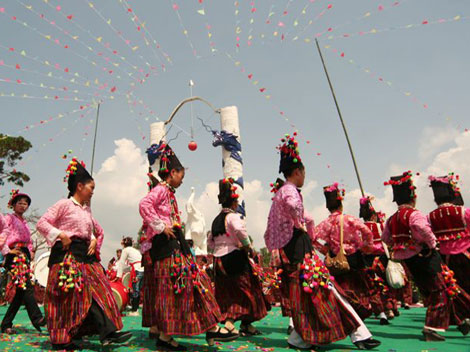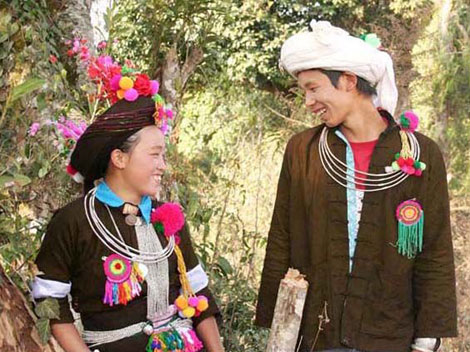The different branches of the Achang people have religious beliefs with many common elements, as well as evident differences.
The Achang from Husa

The Achang from Husa are Buddhist. They follow the Theravada school of Buddhism, the most popular in Southeast Asia. Due to their long contact with the Dai people they celebrate religious festivals characteristic of the Dai, such as the Water Splashing Festival. Intertwined in their Buddhist faith are numerous vestiges of their original religion. This also has close similarities with that of the neighboring Dai. The most important is the cult to the God of the Village or Seman.

Each village has its Seman, which is established in some particularly big or leafy tree that the Achang think contains its spirit. In front of it a stone is placed to mark it. He is worshipped at least twice a year; on the New Year's Day, to request from him a good crop, and during the Harvest Festival, to thank him for the crop. The girls that leave the village to marry should also carry out a ceremony to the Seman, offering a meal that will be distributed among everyone. The Achang think that the Seman is able to protect the people of the village, their livestock and their crops. The ceremonies in honor of the Seman can be directed only by the members of the family that began the establishment of that village.
Another vestige of the traditional religion of the Achang is the cult of Banqing, the God of the Sun. They believe he has power to give prosperity to the people. Each family worships him next to their house. Symbolized by a bamboo tube nailed in the earth, in whose upper end is a basket from which four smaller tubes of bamboo, protrude in the four cardinal directions.
The Achang of Lianhe

The Achang people of Lianhe worship the spirit of their ancestors and the spirits of nature. They think that the spirits of the ancestors are very powerful, capable of bringing prosperity or misfortune to their descendants.
They think that every person has three souls. At the moment of dying each one of the souls follows a different road. One stays in the tomb, another goes to the homemade altars, and the third will meet with the King of the Spirits. After the death of a person, an important ceremony is carried out to accompany his souls. Their shaman or Leibao is summoned, who during one day and night will read the scriptures to show the way for the soul to travel.
In every house there is an altar to the ancestors similar to that of the Chinese that is worshipped at least three times a year: On the first day of the lunar year, and on the first day of the seventh month to request a good crop; and on the 15th day of the eighth lunar month, to thank it. But there are families that carry out ceremonies for their ancestors every month or even every several weeks.
The soul that is in the tomb is worshipped on the day of the Brilliant Purity (Qing Ming) according to the Chinese calendar.
To the soul that is with the King of the Spirits, they offer paper money on the first day of the seventh lunar month, when it is believed that the doors of the sky open up and the spirits can return to earth. Under the symbolic presidency of the ancestors, there take place family meetings.
Sometimes, the spirits of the ancestors have an ugly behavior, and like to bite and to harm to people. They are known as Spirit of the Great Family or of the Small Family, according to the size of the family.
They think that when a person is sick it is because of these spirits. So, they call a Leibao or shaman to expel them by reading the sacred scriptures while a pig and a cow are offered to these family spirits. Less harmful are the spirits of the girls that left the village to marry, but it is believed that if they have received bad treatment, after their death they will return to their native village to bite the people.
Among the spirits of nature the Achang believe that there are some who benefit the people and others who harm them. Among the first are:
- Pang or the God of the Wealth. In some villages he is represented as an old man.
- Guqi, a goddess that protects the warehouse of the grain.
The Spirit of the Earth, of the Mountains, of the Crops and that of the Hunt, all are considered good spirits, and are sometimes worshipped in the same temple.
Among the bad spirits are those of the Sun, the Moon, the Wolf, the Wild Mountain, Hunger and Fatigue. The most important is Meitou, who was opposed to the King of the Creation. Each evil spirit can bring misfortune and illnesses that are attributed to different spirits according to the affected organs.
The Achang of Luxi
Their religious beliefs are not very different from those of the Achang of Lianhe. They believe that people have three souls, but they only worship their ancestors for two generations.
They think that the illnesses are caused by the spirits of the ancestors that bite people, whom they refer to as the Great Family or the Small Family.
Among the spirits of nature they emphasize the cult of Dimu or the Mother of the Place, that it is worshipped generally under a great tree next to the village.
For them the Spirits of the Hunt, of the Mountain and of Millet are all benign. Among the malicious ones are the Spirit of Death, the Spirit of Hunger, of Fatigue, of Oppression, and that of Sterility.
The Achang people of Luxi have three types of priests or shamans:
The Motao, that expel the wicked spirits by reciting the scriptures.
The Buguishi, or fortune-tellers, consulted continually on multiple matters.
The Zhangzhai, that direct the ceremonies to honor the gods of the village.





